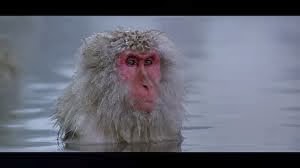Baraka has some amazing shots of many different aspects of the world. It shows mountains, spires, animal life, cloud movement and an eclipse. All these shots evoke a feeling of wonder and it speaks to humans that the world is so much bigger than themselves. Humans cannot control these aspects of life and the unknown forces that do control this is what brings out the awe and amazement. Baraka also touches on the many different levels of society across the world. It travels from desert nomads in Africa to simple hunter-gatherers in Polynesia, and from the populated streets of Tokyo to the bustling city of New York. There are so many varying types of life on Earth and so much, yet so little separates them. The filmmakers of this project strongly emphasized faith and religion throughout the many scenes. And although the peoples may look, dress, act, live differently, they often share many things as well. Baraka showed many religious rituals and ceremonies from Muslim prayer at the Kaaba, to a circle chant group someone in a rainforest. Even though these groups evolved separately, they naturally form religion and faith. Also in the film, Baraka takes its viewers to see the negatives of the world, which include war allusions, a concentration camp, burning oil fields, a fighter plane cemetery, the sorting of baby chickens, and others. The allusions to violence and conflict in the world make the audience feel very disappointed. After the tranquil scenes of religion and beauty, the destruction of the modern world evokes strong emotions. It makes us feel regret and the need to resolve these differences and unite under a common good. Mary Ann Brussat has some of these same ideas, and her most impactful scenes coincide with mine for the most part.
The way the film was shot has a huge effect on how the film is perceived by the viewers. In Baraka the filmmakers use a multitude of techniques that evoke strong responses. One of the way is the close-up of a face. This increases the viewers' intimacy with the subject and allows for them to relate to what their life might be like. Another technique is a time lapse. They use this for the cloud movement, and the busy streets of New York City and Tokyo. This gives the audience a sense of time and repetition over time, as the same monotonous thing happens in the modern world of metropolises. The nature shots used in the film are very important to set the background of the people living on this Earth. It has a humbling effect, and makes for a great transition to life around the world. Also, the music played over the scenes is very important as well. Music definitely brings out certain emotions within a person. At the start of the film, the music is very tranquil and peaceful, because that is how the people of primitivity live. It endears these tribal people to the audience. In contrast, the music whilst the modern shots are showing is more foreboding and unsettling.
Overall, Baraka was an incredible journey through the world, showing the audience the many differences, but most importantly the similarities between the plethora of societies and peoples scattering the surface of the Earth. It is an important lens through which humans should view our planet and our species. Compassion and faith are for the most part lost in the modern world of business and money. But this is not the best way of living for humans as a whole. This idea of the film relates to world literature in the way that it is very cosmopolitan, meaning it is in touch with many different cultures and is relaying the lessons and ideas back to the rest of the world.



No comments:
Post a Comment